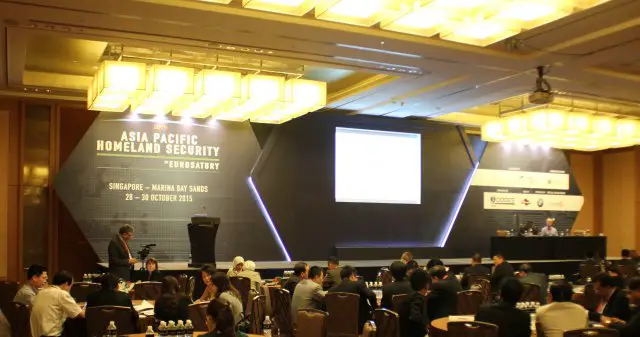Breaking news
Industry experts call for more cooperation to improve urban resilience at APHS 2015 conference 4271015.
 |
|||
|
APHS 2015
ASIA PACIFIC HOMELAND SECURITY 27 - 30 October 2015 Singapore |
|||
|
Press Release at APHS 2015
|
|||
|
|
|||
|
|
|||
| Industry experts call for more cooperation to improve urban resilience at APHS 2015 conference | |||
|
The inaugural Asia Pacific Homeland Security (APHS) conference got underway today, with a number of international industry experts calling for increased regional and multi-sector collaboration to strengthen urban resilience in the region.
|
|||
|
|
|||
 APHS launching conference APHS launching conference |
|||
|
|
|||
|
Taking place in Singapore, APHS 2015 is the region’s first conference and exhibition devoted to homeland and civil security. It is being held at Marina Bay Sands from 27 - 30 October 2015, with the remaining three days focusing on exhibitions which will see global companies showcasing their security solutions, products, facilities and systems to representatives from governments, international organisations, institutions and public bodies as well as NGOs and other private sector companies. Today’s proceedings began with a keynote introduction from Mr Christian Sommade, Director of the French High Committee for Civil Defence, before Part I of the Conference focused on “How to approach Resilience”. During his presentation on “Making Critical Infrastructures More Resilient”, Dr Stephen Brem, Head of Risk Analysis and Research Coordination at the Federal Office for Civil Protection in Switzerland, highlighted the rising need for countries to strengthen their resilience given the various global developments and trends taking place today. “We’re now seeing global supply and production chains becoming more interconnected than ever and there is also an increased mobility of people, goods, money and ideas. With this, countries are now more exposed to different varieties of hazards and threats – and this creates new challenges for risk management. “Countries need to start approaching risk analysis differently and look at how the civil society can work together with the public and private sectors to increase their levels of preparedness towards hazards and threats. Governments need to be able to coordinate and delegate responsibly between specialised administrative units, public and private interests, and society and market in-trends to ensure improved resilience,” said Dr Brem. Part II got underway in the afternoon and focused on lessons learnt from recent events such as the Erawan Shrine blast in Bangkok and the Great East Japan earthquake. Mr Takahiro Ono, visiting researcher at the Asian Disaster Reduction Centre in Kobe, Japan, noted the importance of countries having solid business continuity plans in response to risks and disasters to maintain the permanence of critical operations in the country. “Local governments need to work hand-in-hand with the private sector to establish business continuity plans, especially for the private sector in their respective countries, as they are key to the resilience of the community. Developing a strong business continuity plan alongside the private sector can help ensure the stability of society and economy and allow for businesses to operate normally, which can then help mitigate any challenges in the wake of disaster situations like earthquakes and typhoons,” said Mr Ono. The final segment of the conference looked further ahead and noted speakers delivered presentations on how to implement resilience in preparation for potential events in the future. |



















